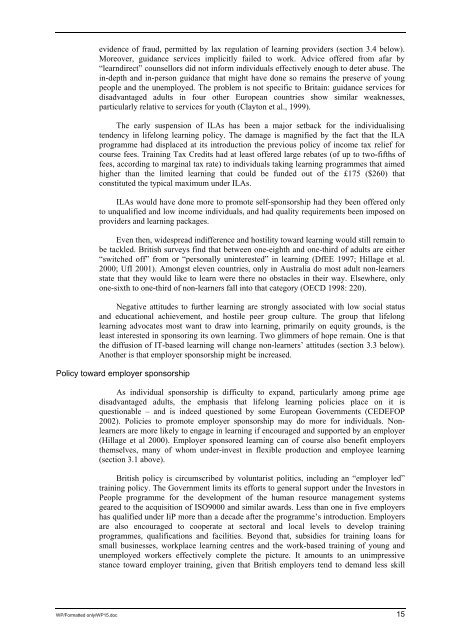Lifelong learning - International Labour Organization
Lifelong learning - International Labour Organization
Lifelong learning - International Labour Organization
Create successful ePaper yourself
Turn your PDF publications into a flip-book with our unique Google optimized e-Paper software.
evidence of fraud, permitted by lax regulation of <strong>learning</strong> providers (section 3.4 below).<br />
Moreover, guidance services implicitly failed to work. Advice offered from afar by<br />
“learndirect” counsellors did not inform individuals effectively enough to deter abuse. The<br />
in-depth and in-person guidance that might have done so remains the preserve of young<br />
people and the unemployed. The problem is not specific to Britain: guidance services for<br />
disadvantaged adults in four other European countries show similar weaknesses,<br />
particularly relative to services for youth (Clayton et al., 1999).<br />
The early suspension of ILAs has been a major setback for the individualising<br />
tendency in lifelong <strong>learning</strong> policy. The damage is magnified by the fact that the ILA<br />
programme had displaced at its introduction the previous policy of income tax relief for<br />
course fees. Training Tax Credits had at least offered large rebates (of up to two-fifths of<br />
fees, according to marginal tax rate) to individuals taking <strong>learning</strong> programmes that aimed<br />
higher than the limited <strong>learning</strong> that could be funded out of the £175 ($260) that<br />
constituted the typical maximum under ILAs.<br />
ILAs would have done more to promote self-sponsorship had they been offered only<br />
to unqualified and low income individuals, and had quality requirements been imposed on<br />
providers and <strong>learning</strong> packages.<br />
Even then, widespread indifference and hostility toward <strong>learning</strong> would still remain to<br />
be tackled. British surveys find that between one-eighth and one-third of adults are either<br />
“switched off” from or “personally uninterested” in <strong>learning</strong> (DfEE 1997; Hillage et al.<br />
2000; UfI 2001). Amongst eleven countries, only in Australia do most adult non-learners<br />
state that they would like to learn were there no obstacles in their way. Elsewhere, only<br />
one-sixth to one-third of non-learners fall into that category (OECD 1998: 220).<br />
Negative attitudes to further <strong>learning</strong> are strongly associated with low social status<br />
and educational achievement, and hostile peer group culture. The group that lifelong<br />
<strong>learning</strong> advocates most want to draw into <strong>learning</strong>, primarily on equity grounds, is the<br />
least interested in sponsoring its own <strong>learning</strong>. Two glimmers of hope remain. One is that<br />
the diffusion of IT-based <strong>learning</strong> will change non-learners’ attitudes (section 3.3 below).<br />
Another is that employer sponsorship might be increased.<br />
Policy toward employer sponsorship<br />
As individual sponsorship is difficulty to expand, particularly among prime age<br />
disadvantaged adults, the emphasis that lifelong <strong>learning</strong> policies place on it is<br />
questionable – and is indeed questioned by some European Governments (CEDEFOP<br />
2002). Policies to promote employer sponsorship may do more for individuals. Nonlearners<br />
are more likely to engage in <strong>learning</strong> if encouraged and supported by an employer<br />
(Hillage et al 2000). Employer sponsored <strong>learning</strong> can of course also benefit employers<br />
themselves, many of whom under-invest in flexible production and employee <strong>learning</strong><br />
(section 3.1 above).<br />
British policy is circumscribed by voluntarist politics, including an “employer led”<br />
training policy. The Government limits its efforts to general support under the Investors in<br />
People programme for the development of the human resource management systems<br />
geared to the acquisition of ISO9000 and similar awards. Less than one in five employers<br />
has qualified under IiP more than a decade after the programme’s introduction. Employers<br />
are also encouraged to cooperate at sectoral and local levels to develop training<br />
programmes, qualifications and facilities. Beyond that, subsidies for training loans for<br />
small businesses, workplace <strong>learning</strong> centres and the work-based training of young and<br />
unemployed workers effectively complete the picture. It amounts to an unimpressive<br />
stance toward employer training, given that British employers tend to demand less skill<br />
WP/Formatted only/WP15.doc 15

















